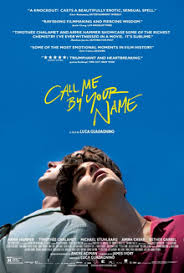I’ve been thinking about this for over a week. “What am I going to say about Call Me By Your Name, a film that matters a great deal to several people who mean a lot to me in order to convey that I admire it while explaining my caveat?”

While dreaming last night–I kid you not–it came to me.
First the laudatory.
The performances (save Michael Stuhlbarg’s dad speech to Elio, which was too spot on for even this talented actor to deliver with a convincing face) are as lush and vibrant as the Italian countryside.
And, speaking of the landscape, who doesn’t want to summer there? The location evokes a mood that is both languid and fresh, restful and inspiring, primal and cerebral. These dichotomies create a tension that benefits the tone of the film and fits its themes as a coming of age story for a gay teenager who is different from other people because of his intellect and courage.
My problem with the film rests in another dichotomy, one that does not work so well for me, even though I admit that it should…on paper if not in practice.
Pacing.
The first part of the film is a bit fragmented. The elisions (or, what I perceived that way after a single viewing) even out as the film unfolds. Arguably, this mirrors a process that is internal for Elio (the exquisite Timothée Chalamet) as he seeks a connection with the older and also worldly Oliver (Armie Hammer), but that is not precisely how it plays out on screen.
Love can be messy. The same applies to films. Messiness does not (always) undermine evocative power, however.
Two additional points:
1) After admiring his work for decades, it’s nice to see James Ivory still in the game.
2) Watching Call Me By Your Name has made me think repeatedly of Hiroshima Mon Amour, a film that has meant more to me almost every time I’ve watched it.
Perhaps the same will turn out to be true, at least in some degree, for Call Me By Your Name.

When I first watched this film, I experienced an out-of-body experience at the beginning from anticipation (finally seeing this film!) and the feeling of being plunged into this world. I was taking in the beauty of it, not knowing when the “connection” would happen between Oliver and Elio. I was getting my bearings along with Elio as the beautiful Oliver, who seems self-assured in “the things that matter,” is introduced.
While they are “wasting so many days,” at first it does seem that there is a “fragmented” feeling, but then as the film and the characters “come together,” I realized that the “fragmented search” for connection goes both ways and that there is so much richness that I did not fully grasp the first time. At my second viewing, I found myself filling the “gaps” with how they steal glances and more sustained looks at the other, interpret the other’s reactions, and react to the other’s actions. I realized that at my first viewing, I’d (unintentionally) watched Oliver more than I’d watched Elio, and not always through Elio’s eyes. At my second viewing, I watched Elio more, and through his eyes I watched Oliver. These “ways of watching” contribute to the subtle, unending layers of this film that will make it one that I will re-watch and re-watch. There’s Oliver. There’s Elio. There’s Oliver and Elio. There’s Oliver watching and reacting to Elio. There’s Elio watching and reacting to Oliver. There are Elio’s parents and their realization of what they can see happening between their son and Oliver. There’s Mafalda. There are the stunning backdrops of each setting.
Elio’s dad’s speech, to me, is a representation of all parents who should but do not say those words to their children, or say them too late when their children are in their 30s and 40s. The scene is abstract in that it takes on the shape of an “everyparent, everychild” scenario with characters who are extraordinarily ordinary. As Oliver and Elio “waste so many days” and then finally come together, I realized that they were always together.
Even more devastating (in a beautifully honest sense) for me is how this film causes me to unpeel layers of my own experiences at 17, at 24, at 31. I do not regret the Elio-like courage I had at 17, but I do regret things I had no way of knowing and thus no way of preventing. But I certainly did not shield myself from feeling. And feel I did. And now here I am. I am currently reading _Call Me By Your Name_ and am excited about plans for film sequels.
I love this post (and that this interpretation of the dad speech did cross my mind, too!). Chad, I don’t disagree with anything you’ve written, and I think the personal experience we bring into a screening informs our reading of it in a myriad of ways. Maybe we can watch it together when I’m back from Copenhagen.
I haven’t seen this film so I probably should not be posting, but I heard an NPR segment today about this movie that discussed the age difference of the lovers as problematic, and again, without having seen the film, the guest’s reflections about that (one character clearly a man and the other clearly a boy) made sense to me. The views of this guest (can’t remember her name) were informed by a “consensual” (hetero)
affair with a professor when she was a student, one she now sees she was not in control of as she had then believed. I guess I need to see the film now….
I certainly considered that aspect of the film but did not find it objectionable in the context of this film (the response of the teenager’s parents is more problematic for me). Part of that is because the younger partner is the initiator (after his first sexual experience with a girl who is infatuated with him—his treatment of her, while understandable as his identity unfolds, is painful to watch). Another aspect is that he is presented as a precocious youth in multiple ways. As we know, these things do happen and with varying results in life and in art. Thanks for the conversation…
Thanks for the engaging comment. I certainly considered that aspect of the film but did not find it objectionable in the context of this film (the response of the teenager’s parents is more problematic for me). Part of that is because the younger partner is the initiator (after his first sexual experience with a girl who is infatuated with him—his treatment of her, while understandable as his identity unfolds, is painful to watch). Another aspect is that he is presented as a precocious youth in multiple ways. As we know, these things do happen and with varying results in life and in art.